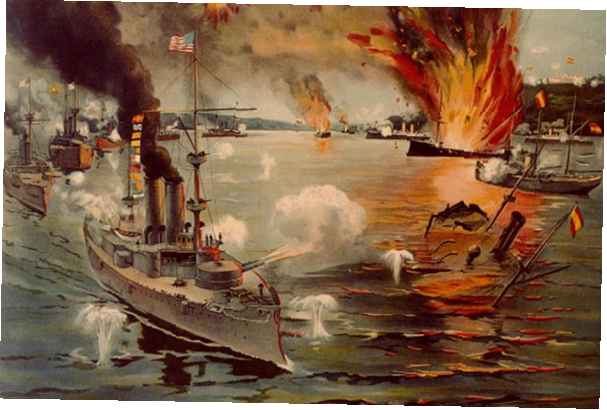1898 Spanish Crash
Spanish decline and American rise at the dawn of a new century

U.S. ships hit and sank the Spanish fleet on May 1, 1898 in Manila Bay.
On February 15, 1898, the American battleship Maine was anchored in Havana Bay when it suddenly exploded, killing all 255 sailors on board. It was most likely a tragic accident that was exploited by President McKinley's government to declare war on Spain on April 25. Washington wanted to use the pretext to support the anti-Spanish rebels fighting in Cuba and the Philippines, Madrid's last colonies, in order to extend its hegemony. If the American fleet had gained control of the seas, it would have prevented the Spaniards from supplying their troops suppressing the revolts. The first success came on May 1 in front of Manila where the American ships sank the Spanish squadron, effectively closing the Pacific front shortly thereafter. Meanwhile, Spain had sent a fleet of 6 heavy ships under Admiral Cervera to defeat the Americans at least in the Caribbean. The fleet arrived in front of Santiago de Cuba on May 15, rather worn out from the journey, and remained stationary for 40 days for repairs and to stock up on coal and ammunition. Initially frightened by what was still considered the world's fourth fleet, the Americans had remained to protect the Atlantic ports and only moved towards the decisive battle at the end of June, reaching Santiago on July 2. They had 6 ships available, including 4 battleships, in fact the best ships in service that were also in excellent condition. Cervera left the port and engaged in battle, being the first to open fire. However, the American response was massive, so much so that his flagship was hit and grounded. The Cristobal Colon, a ship produced in Italy belonging to the Garibaldi class, managed to damage the battleship Iowa, but after being hit from all sides, it was sunk along with the rest of the fleet. After this further defeat for Spain, there was only one option left: surrender; they ceded Cuba, the Philippines, Puerto Rico, and Guam. The war was quick but significant: Spanish power was waning while American power was on the rise.
Alberto Maria Banti, L’età contemporanea dalle rivoluzioni settecentesche all’imperialismo, Bari, Editori Laterza, 2021 quattordicesima edizione
Carlo Capra, Storia Moderna 1492-1848, Mondadori, 2016, terza edizione
Website: Giovanni Pannella, La guerra Ispano Americana del 1898 Considerazioni su un caso di potenza navale sulla carta, Rivista Marittima, 1998, Academia.edu pag. 77-91 Consulted 2024
2025-05-04
Salvatore Ciccarello
